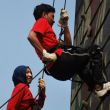Guide on gender mainstreaming published
MSM has published a practical guide that can contribute to gender mainstreaming in Higher Education Institutions in Indonesia and beyond.
This manual has been prepared as part of the EP-Nuffic funded project ‘Building Capacities in Agribusiness at Bogor Agricultural University and collaborating partners, Indonesia’, with support from Van Hall Larenstein University of Applied Sciences.
The guide aims to take away the ‘elite’ notion of gender and instead put it forward as something that concerns all of us: men, women, boys and girls. Working on equality for men and women will contribute to a better world. ‘Gender equality’ does not suggest equality based on sameness, but rather refers to equality based on differences. The focus on the differences between men and women can open the eyes of educators, policy makers, students and their parents to other forms of discrimination and social exclusion. This guide does not address all forms of discrimination. It primarily focus on gender, simply because when we talk about men and women, most recognize a need to give and receive equal chances in life.
This guide is the result of many years working on gender mainstreaming in Higher Education Institutions in Asia and Africa. The focus of this guide is on institutions in Indonesia, based on experience working with the Department of Agribusiness, Bogor Agricultural University. It is divided in different sections. In each section, information and activities are provided to guide the mainstreaming process. These activities can be undertaken as part of a training or capacity-building program.
Section 1 gives an introduction to this guide, its purpose and gender issues in higher education in Indonesia.
Section 2 describes an important step in gender mainstreaming, the Gender Awareness Workshop. The aim of a Gender Awareness Workshop is to sensitize staff on the concepts of gender and gender issues. Tools and topics to be used and covered during this workshop are described in Section 2.
Section 3 explains the process of a gender audit and an assessment of an organization from a gender perspective. The results and conclusions from the audit are translated into gender policy and action plans.
Section 4 discusses ways to make higher education curricula more gender sensitive.
Section 5 presents ways of making research gender-sensitive.
Section 6 is about addressing differences between male and female students and classroom diversity.
Section 7 addresses sensitive topics, such as bullying and sexual harassment in the classroom and on the work floor.
Click here to download the practical guide “Gender Mainstreaming in Higher Education in Indonesia”.
The tools and frameworks used in this book have been taken and adapted from various sources (listed under ‘References’). Readers are encouraged to multiply this guide.
Related news:
Refresher course: ‘Entrepreneurial University Transformation in South-East Asia’, taking place in Bandung, Indonesia from 21 November – 2 December 2016
MSM Executive Education for the Indonesian Court of Audit
MSM working to strengthen Indonesian agribusiness
Female Talent Development Toolbox now online!

